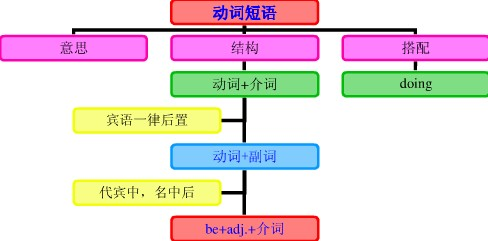本试题 “The government________the serious problem of juvenile delinquency.[ ]A.faced withB.faceC.was faced withD.was faced to” 主要考查您对动词短语
一般过去时的被动语态
等考点的理解。关于这些考点您可以点击下面的选项卡查看详细档案。
- 动词短语
- 一般过去时的被动语态
动词短语的概念:
动词常和某些其他词类用在一起,构成固定词组,形成所谓短语动词(phrasalverb)。和动词一样,短语动词也可分为及物和不及物两种。短语动词可以作为一个整体看待,同一般动词一样使用。
动词短语的搭配类型:
1)动词+介词:这类短语动词用作及物动词,后面须跟宾语。
如:The small boy insisted on going with his parents. 那男孩坚持要跟父母一起去。
Do you often listen to broadcasts in English? 你常听英语广播吗?
Look at the children. Aren't they lovely? 看着这些孩子们。他们多么可爱呀!
We stand for self-reliance. 我们是主张自力更生的。
这一类的短语动词还有很多,如depend on(upon)(依靠),wait on(服侍),look for(寻找),deal with(对待),look after(照料),wait for(等待)等。
2)动词+副词:
这类短语动词有的用作及物动词,有的用作不及物动词。
如:I always get up as soon as the bell rings. 我总是一打铃就起床。(不及物)
Look out, there's a car coming! 当心,来汽车了!(不及物)
Have you handed in your exercises already? 你已经交练习了吗?(及物)
Please don't forget to put on your coat, it's cold outside. 请不要忘记穿外衣,外面很冷。(及物)
这一类的短语动词还有很多,及物如put out(扑灭),eat up(吃光),put down(放下);不及物如set off(出发),come up(走近),go on(继续)。
注:"动词+副词"这类短语动词和上面第一类"动词+介词"的不同之处在于:"动词+介词"用作及物动词,后面须跟宾语。"动词+副词"则有的及物,有的不及物;用作及物动词而宾语为人称代词或自身代词时,副词往往放在宾语之后。
如:Please wake me up at five tomorrow. 请在明天早上五点唤醒我。
If you have done your exercises, please hand them in. 如果你们练习做完了请交来。
She doesn't normally behave like that, she's putting it on. 她通常并不如此表现,她是装出来的。
注:这类短语动词有不少可兼作及物和不及物动词用。
如:He took off his hat when he entered the office. 他进办公室后脱下帽子。(及物)
The plane took off at seven sharp. 飞机在七点整起飞。(不及物)
Charlie rang up Neil to ask about the time of the meeting. 查理打电话给尼尔问开会的时间。(及物)
If you can't come, please ring up and let us know. 你如来不了,请来电话告诉我们一声。(不及物)
3)动词+副词+介词:
"动词+副词"之后有的可以再加一个介词,形成另一种短语动词。这类短语动词用作及物动词。
如:Do not give up hope. We must go on with the experiment 不要失望。我们必须继续试验。(go on with继续)
He came up to me. 他走到我跟前。(come up to走近)
这类短语动词还有:look down upon(看不起),do away with(去掉),put up with(忍受)等。
4)动词+名词+介词:
这类短语动词也是及物的。
如:He shook hands with all the guests at the banquet. 他在宴会上和宾客一一握手。
Young pioneers often come to the Children's Palace to take part in after school activities.少先队员经常到少年宫来参加课外活动。
Pay attention to the temperature of the stored rice. 注意仓库里的稻谷的温度。
Her job is taking care of the babies. 她的工作是照顾婴儿。
这一类短语动词还有:put an end to(结束),take notice of(注意),catch hold of(抓住),lose sight of(看不见),make use of(利用)等。
动词短语知识体系:

一般过去时被动语态的概念:
表示过去经常性、习惯性被动动作或过去某一时刻发生的被动性动作。主语(动作承受者)+was/were+过去分词(+by+施动者)构成。
一般过去时被动语态与现在完成时被动语态用法区别:
现在完成时与一般过去时被动语态均指某一被动性动作发生在过去,但现在完成时被动语态强调发生在过去的被动性动作对现在造成影响,或发生在过去的被动性动作一直延续到现在并有可能继续延续下去。一般过去时被动语态表示过去经常性、习惯性被动动作或过去某一时刻发生的被动性动作。
例如:This machine has been repaired. 这台机器已被修好。
析:这台机器在过去某一时刻被修,并对现在造成影响,说明这台机器现在已无毛病,可以投入使用。
例如:This building has been built for a month. 这幢楼房已被建一个月。
析:这幢楼房一个月之前开始被建,一直延续到现在并有可能继续下去。
例如:This bridge was built last year. 这座桥是去年建的。
析:该句仅强调这座桥是去年被建造的。
例如:Volleyball was often played in this playground. 这个操场上过去经常有人打排球。
析:该句强调在这个操场打排球是过去经常性、习惯性动作。
发现相似题
与“The government________the serious problem of juvenile del...”考查相似的试题有:
- The teacher stressed again that the students should not __________ any important details while retelling the story.[ ...
- He is __ that everyone likes to make friends with him.A.a such honest boyB.so honest a boyC.so an honest boyD.suc...
- The grammar book she ___ was not in the library.A.turned toB.looked upC.look throughD.referred to
- On April 24, Tsinghua University its 100thanniversary at the Great Hall of the People in Beijing.A.congratulatedB.c...
- I’d __________ it if you could fix my laptop as soon as possible. I need it to prepare for my lecture next week.A.ad...
- 一How will she behave in case of our failure?—She’ll put the blame on us if it badly.A.turns upB.turns downC.turn...
- He there with us though he was not feeling well.[ ]A. insisted on goingB. insisted to goC. insisted in goingD. insist...
- I’m __ pop music, but I’m not __ classical music.A.fond of; likeB.love; interested inC.interested; intoD.fond...
- If the children are badly ____, they behave badly.[ ]A. brought inB. brought upC. brought aboutD. brought back
- Mr. Wang came home so thin and weak that his own children hardly______ him.A.knewB.realizedC.recognizedD.noticed